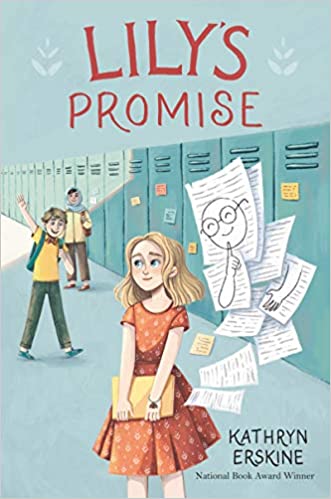LILY'S PROMISE
BOOK REVIEW

Lily’s Promise is a great read on so many levels. The book’s namesake, Lily, has just lost her beloved father to an illness that taxed family’s resources. She and her mother, an immigration lawyer, move to a smaller house in a different neighborhood. Lily had been home schooled, taught by her father. Painfully shy, Lily now has to face multiple challenges: life without her father and starting public school for the first time in a place where she knows no one.
Fortunately, one of the first people Lily meets is Hobart, a quirky guy who manages to be in love with life despite having a difficult father who dislikes immigrants and despite being bullied at school by a boy named Ryan. Hobart is a kind soul who is sad about being tormented but doesn’t let it define him or crush his spirit. Lily and Hobart befriend Skylar, a boy whose family is going through rough times financially and Dunya, a girl whose family just escaped a terrible situation in the Middle East.
This story is about integrity and human decency, but it is told in a way that is gently persuasive, not didactic or preachy. The author touches on many issues including the treatment of immigrants, the cost of healthcare, dirty pool in politics (at the middle school election level), how to handle bullying.
The plot is filled with conflicts galore and therefore is a page turner. Lily wants to honor her father’s memory by being assertive and taking small risks. Hobart is trying to figure out how to stand up to his both his father and Ryan. Ryan’s goal in life is to create misery. His victims include his teacher, Hobart, Lily, Skylar and Dunya.
What makes this book brilliant is a clever literary device that Erskine employs which is making Libro (a book) a primary character in the story. Perhaps other authors have done this before, but I’ve never seen it. Between each chapter, Erskine inserts wry and pithy observations from the Libro. Never more than a paragraph or two, these comments are hysterical, analyzing various literary elements in the story like character, plot. By discussing these elements, Libro exposes a young reader to the process of how a story is created and a way to assess how that process is working. In some ways, Libro is training children how to be good literary critics.
Libro refers to the author as the Imaginer and critiques her writing habits and inclinations. I love the relationship between the two, lots of affection with just the right amount of tension. Also, readers always love to hear personal facts about an author and in this case, Libro is happy to oblige. The voice of Libro is endearing; I especially love the addition of the British accent—a very nice touch.
Lily’s Promise contains many weighty themes. Comments from Libro add needed levity to the prose. The sections are tightly integrated with the content of each chapter, so they serve to move the plot along.
Lily’s Promise is a book about empathy. Everyone has a backstory. Each backstory contributes to a character’s behavior. Erskine’s strength is that she does not paint in black and white. She allows for her characters to grow and change, even the villains. Her characters choose to embrace, to extend grace and forgiveness. I can see this beautiful book leading to many fruitful discussions in homes and classrooms.
